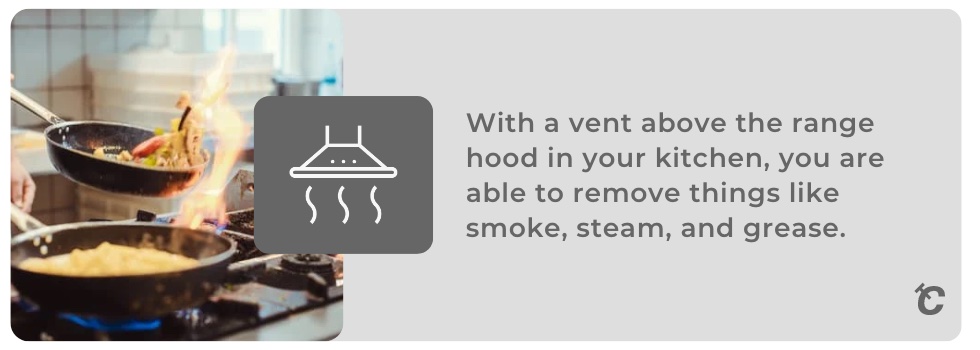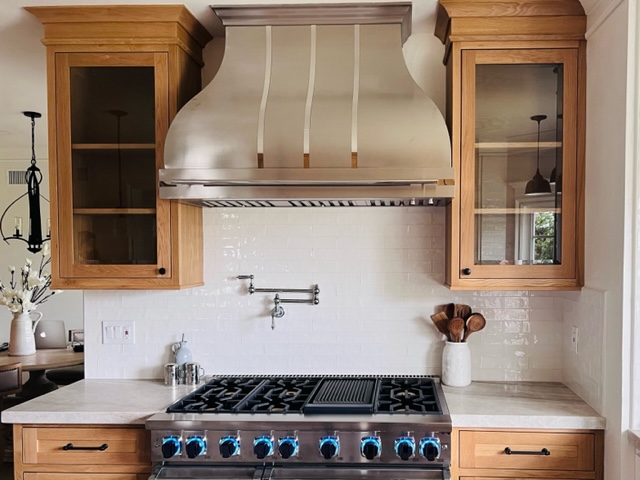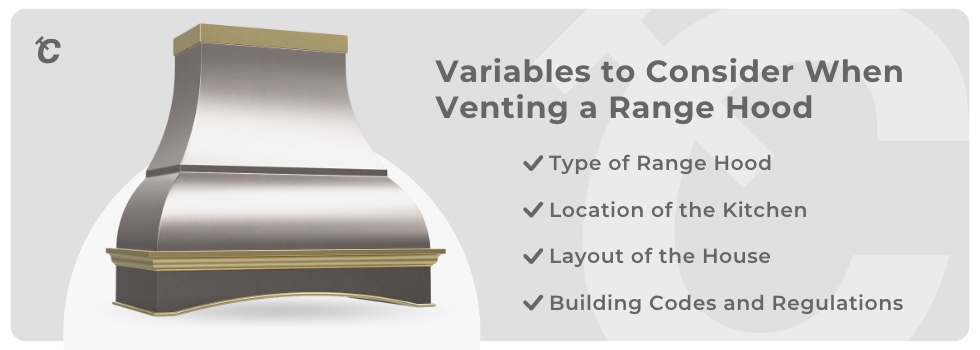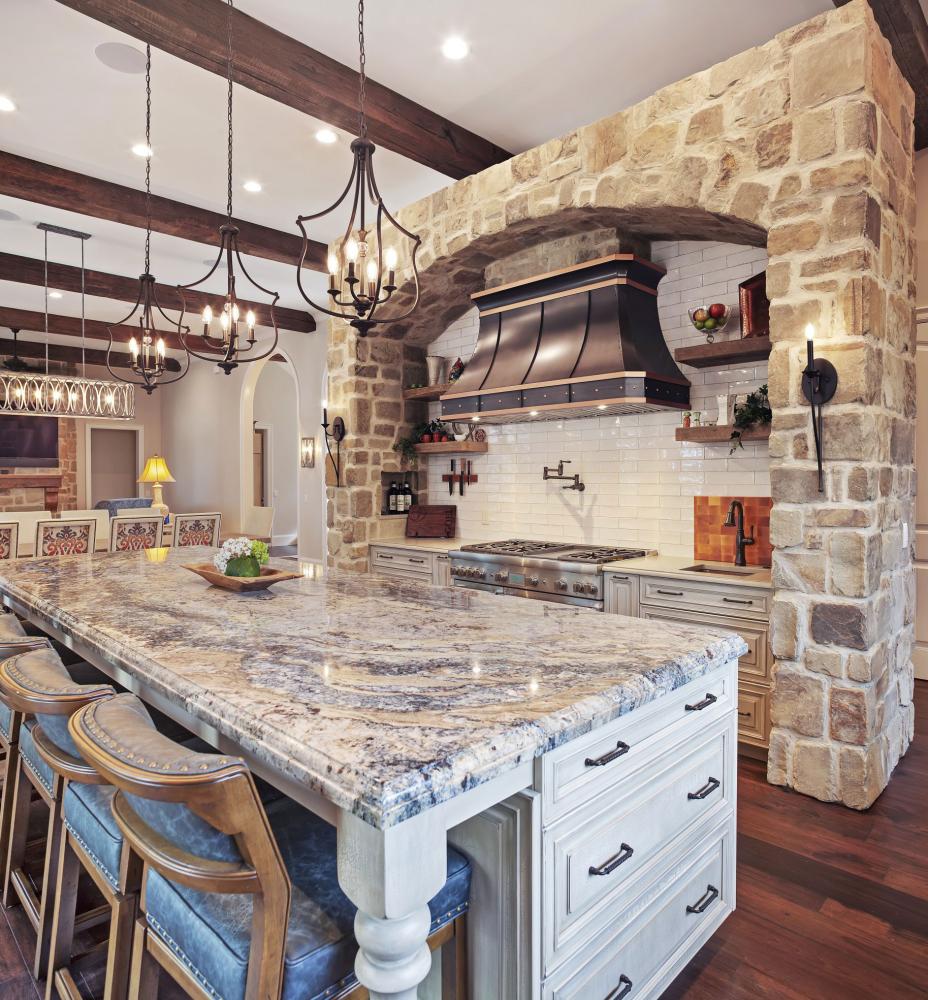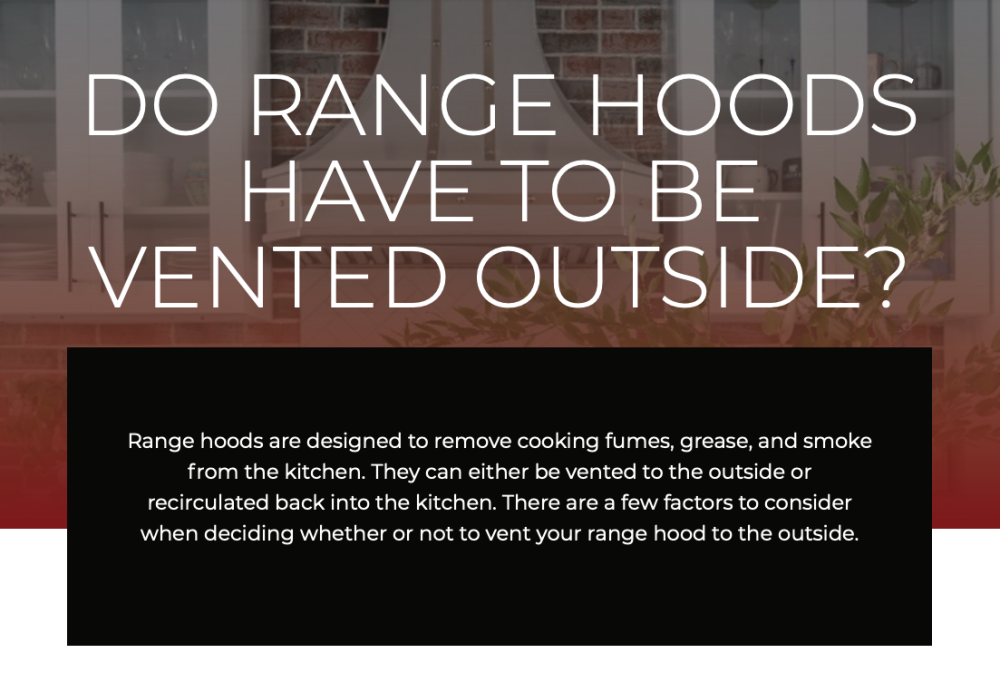
A ducted range hood is an essential appliance in your home. It removes grease, smoke, strong odors, and other harmful particles from cooking food. However, some think a ducted range hood doesn't necessarily have to be installed outside. They claim that a ducted range hood works just fine without being exposed to the elements. The truth is that a ducted range hood is much more effective when installed outdoors. Many experts recommend installing a ducted range hood on the exterior wall of your house.
This way, you'll improve the indoor air quality and filtration in your home and eliminate risks, including:
- Leaky pipe inside your home
- Grease-related kitchen fires
- Dirty air quality
- Bacteria from the humidity
Why Range Hoods Need to be Vented Outside
When anyone walks into a kitchen, especially a new one, their eye is directed to the stove's location. Then, they direct their attention to the range hood. A range hood stands out in a kitchen because it is an essential component of any kitchen, helping to remove smoke, steam, and cooking odors from the air inside.
But there are a few details that many people may need to learn about range hoods. One of these details is where to place the vent inside or outside. The short answer is yes, and we could probably end this article right here as if our job was complete. But various factors would apply to venting a brass range hood outside versus not at all. Then, you would want to know why this is even essential information to consider for your home. Let’s go further and explore these factors in depth.
If you decide to go with a ducted range hood, make sure that you buy one that fits well into your kitchen design. At CopperSmith, we have an extensive selection of range hoods offering the most premium ventilation. So whether you're looking for a specific material, or color or want a custom design, you can find what you're looking for on our website. We can give you recommendations when installing a ducted range hood, but you should also double-check with your contractor. He/she will know what type of construction materials you have in place and whether it is possible to add a venting system to your existing walls.
Is It Possible to Install a Range Hood Without an Outside Vent?
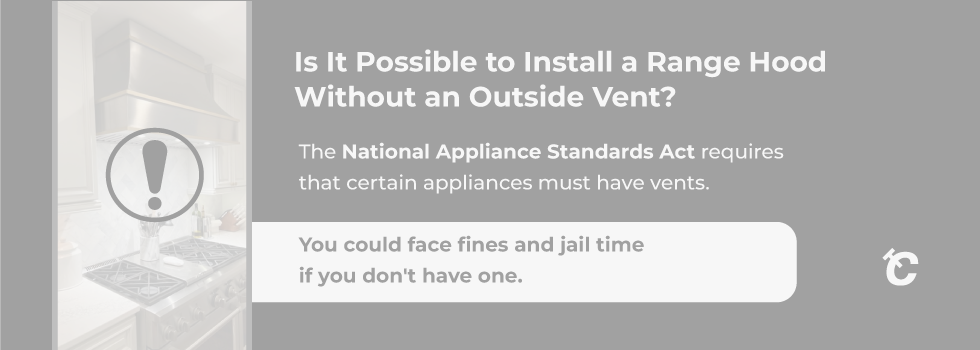
If you want to install a ducted range hood without an outside vent, there are a few things you need to know. First off, it's probably illegal. Second, it won't work very well. And third, you might end up damaging your house. The National Appliance Standards Act requires that certain appliances must have vents. You could face fines and jail time if you don't have one. But what if you just want to add a hood over your stovetop or a fan above a cooktop? Do you really need to worry about the consequences of breaking any laws? Let's look at the top reasons why you shouldn't bother installing a range hood without an exterior vent.
Why Is Ventilation Necessary for a Kitchen?
Remove Grease, Steam, and Smoke From Your Kitchen
When you’re frying your grandma’s famous fried chicken or trying out a new recipe you found online, you’re not sure how it will taste or whether your kitchen and home will survive the smell and the layers of grease in the air.
This is why it’s important to have a range hood vented to the outside of your home. With a vent above the range hood in your kitchen, you are able to remove things like smoke, steam, and grease. A layer in the air of smoke and grease is not only difficult to clean afterward but also unpleasant to eat around.
Safety
Grease tends to accumulate near heat sources like stoves and ovens when cooking food. This grease can become extremely hot and dangerous. If you don't have an outlet nearby, the grease could drip down onto anything it touches, including your walls and floors. In addition, grease fires are incredibly difficult to extinguish. They require ventilation, and vents allow smoke and gasses to escape.
You're likely wasting money
Installing a range hood without an external vent doesn't save much energy. Most range hoods use fans to pull air into the unit and exhaust out the side. So you'll still need to run the fan, whether or not you have an external vent. And unless you live in a super drafty area, you'll still need a vent anyway.
You risk damage to your home
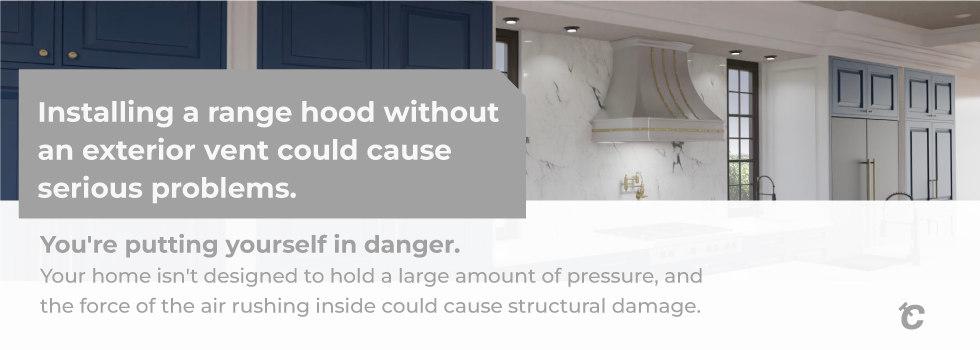
Installing a range hood without an exterior vent could cause serious problems.
For starters, you're putting yourself in danger. Your home isn't designed to hold a large amount of pressure, and the force of the air rushing inside could cause structural damage.
Also, you're increasing the chances of fire. As mentioned, grease fires aren't easy to put out, and if you don't provide enough airflow, you could make matters worse.
So if you want to install a range hood without an external vent, here's how you can do it safely.
- Call your local building inspector. He or she will tell you if you need an inspection permit. If you do, you'll need to find a way to provide sufficient ventilation.
- You should find a place to mount the hood. Make sure it's high enough that it won't hit people or objects.
- You'll have to figure out how to keep the grease from dripping down onto surfaces. To prevent this, you could probably cover the entire surface with something waterproof. You'll also need to be on top of cleaning the range hood to keep the air filtration working at its best.
- In terms of maintenance, you may need to clean or change the charcoal filter in your ductless range hood about once or twice a year.
- If you've had a ducted one for a while and you're looking for a new, sleek model, consider a replacement hood with us at CopperSmith and what the costs of it may be.
Ducted vs. Ductless Hoods: Are there any similarities and differences?
Let's take a look at some key differences between ducted and ductless hoods and why an outside vent might be a good idea.
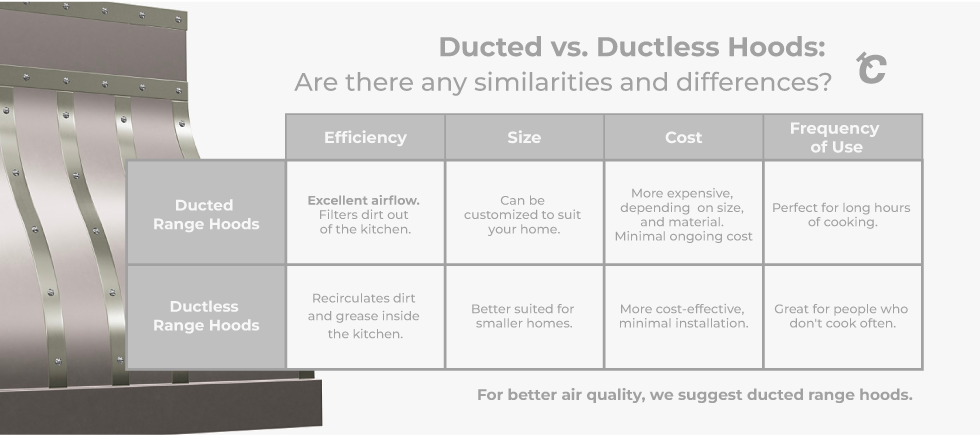
For better air quality, we suggest ducted range hoods.
Using an outside vent is highly recommended as we discovered a gas stove could omit certain pollutants, including carbon monoxide, nitrogen oxide, and formaldehyde.
But if you're looking to save money, consider buying one that does not require plumbing installation.
These models work precisely like traditional units, except that they use less energy and cost less.
Can you Convert your Ductless Range Hood to Ducted?
Range hoods come in many styles, sizes, shapes, and designs.
It is possible to convert what you have into a ducted hood, but it does come with installation fees.
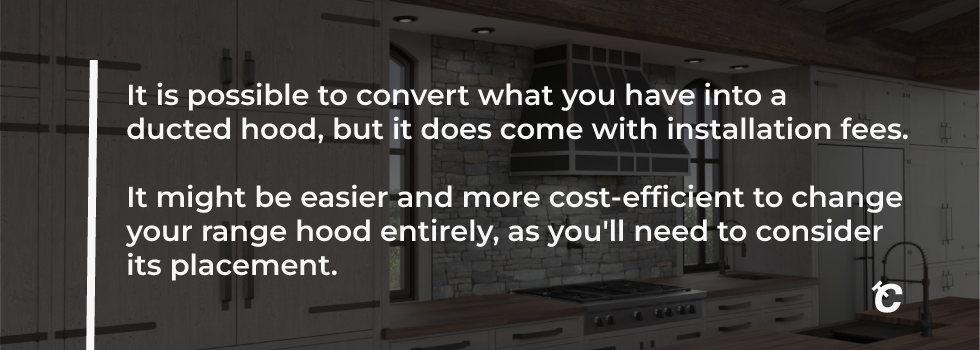
It might be easier and more cost-efficient to change your range hood entirely, as you'll need to consider its placement.
For example, you typically install a range hood over a cooktop, which pulls smoke and grease out of the kitchen.
So Do I Need an Outside Vented Range Hood in My Kitchen?
A range hood is an indispensable piece of equipment in every kitchen. But, if you don't have one in your kitchen, now might be a good time to consider getting one installed.
We looked at key reasons you should install a range hood in your kitchen.
Reduces risk of serious health problems
Smoke and grease build up over time and can cause serious health problems. When cooking food, there is always the potential for smoke and grime to be produced.
This is true if you cook your food directly above a stovetop. These particles can become airborne and inhaled, which is worse for people with breathing concerns like asthma.
Energy Savings
Range hoods help reduce energy costs because they capture grease and smoke before it enters the home.
The ducted hood traps moisture and solid odors and releases them outside.
By reducing the amount of heat that needs to be supplied to the room, you can save money on heating bills.
Get Rid of Odors
Then there’s the odor. When a recipe smells good, there are never any complaints from those who will enjoy the meal. However, there could be a lingering smell besides the delicious aroma of the final product. Everyone will better appreciate the meal if the environment is not wrought with terrible odors and a film of lingering grease.
Sometimes the smell of an onion, cheese sauce, uncooked broccoli, and more can make it an unpleasant environment to eat in. A vent directed outside the home helps to remove these odors and grease from the air. Additionally, venting outside helps to prevent byproducts like grease from accumulating on walls, ceilings, and other surfaces, reducing the need for frequent cleaning and maintenance.
Protect Your Kitchen
People often don’t realize how much damage steam, smoke, and other pollutants can cause to their kitchens. For instance, excess moisture buildup can cause water damage in cabinets and walls, or even structural damage if it seeps into the walls. Smoke and cooking odors can linger on surfaces, leading to stains and unpleasant smells. Similarly, grease buildup can attract dirt and grime, making your countertops and jars sticky.
Reduce the Buildup of Moisture
Finally, venting outside helps to prevent the buildup of moisture, which can lead to mold and other moisture-related problems in the kitchen. Whether you’re cooking pasta or making soup, there’s a good chance that the air will become humid due to the steam produced by heating up water. Without a proper ventilation system, this humid air will stick to any surface be it the walls, ceilings, windows, cabinets, or kitchenware.
This moisture can eventually lead to mold growth if left unchecked, and potentially even rot if there is wood in your kitchen. By having a system that vents this moisture outside, the air around your range is replaced with drier air as you cook. This is an effective way to stop potential mold growth.
Pollutants can also lead to poor air quality which could potentially aggravate allergies and respiratory issues. This can ultimately make the kitchen an uncomfortable place to be in and may even lead to damage if you’re not careful.
Should I Replace My Ductless Range Hood With an Outside Vented One?
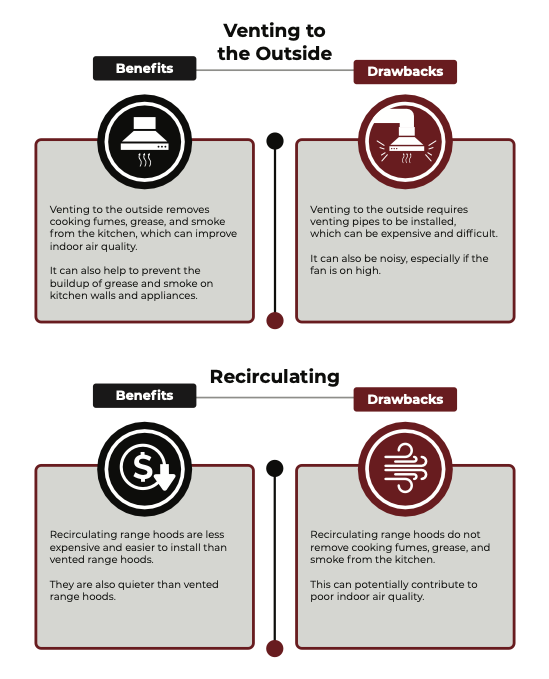
A ductless hood is better suited for indoor use because it does not require fans, so it's not as noisy, especially for smaller kitchens.
However, some prefer a ducted hood because it allows better air circulation around the kitchen.
Depending on the design of your home, how often you cook, and your budget, an outside-ventilated range hood could be better for you in the long term.
We looked at some venting options to consider when choosing how to install your range hood:
- Indoor exhaust ducted to the roof or attic
- Outdoor exhaust ducted to the chimney
- Open vents in the wall
- Sliding glass doors
If you decide to go with a ducted hood, ensure you place it close to the ceiling. This way, hot air rises up and out of the room.
You do not want to put a vent too low because this could cause condensation problems.
Variables to Consider When Venting a Range Hood
When it comes to venting a range hood outside, there are several variables that homeowners must consider. These include the type of range hood, the kitchen's location, the house's layout, and local building codes and regulations.
Type of Range Hood
The kind of range hood that you choose can impact your venting. There are two main types of range hoods: ducted and ductless. Ducted range hoods are vented to the outside, while ductless range hoods use filters to remove cooking byproducts from the air before recirculating them back into the kitchen. Ductless range hoods can be convenient in some situations, but they are generally less effective than their counterparts at removing smoke, steam, and odors from the air. Additionally, ductless range hoods require more frequent filter replacements and cleaning than ducted hoods.
Height of the Hood
In general, it’s recommended for a range hood to be mounted between 27 and 36 inches from the cooktop. However, this might not always be possible due to your kitchen. Some people may have shorter ceilings, or there may be obstructions in the way such as old cabinets and lighting fixtures. Depending on your circumstances, you may need to make more space for the hood so that it can be as efficient as possible.
Location of the Kitchen
Although you may not think of it, the location of the kitchen within the house can also impact the venting process. Venting the range hood outside may be more manageable if the kitchen is on an exterior wall. However, venting outside may require additional ductwork and installation costs if the kitchen is in the center of the house or on an interior wall. So, you’ll have to consider how the vent would look for aesthetics based on where your kitchen is located in the house.
Layout of the House
We just talked about the position of the kitchen when installing a vented range hood. Another critical component in the vented hood explanation process is the house's layout. For example, if the range is located on an exterior wall, it may be easier to vent the range in the center of the kitchen hood outside. However, outside venting may require additional ductwork and installation costs if the range is on an island or a house with multiple floors may require extra planning and installation for installing ventilation.
Sound Considerations
Range hoods are often some of the noisiest appliances that we’ll have in our homes. Most range hoods are given a sone rating which represents how much sound it produces. 1 sone is equal to whispering, whereas 5 sones are equivalent to a quiet restaurant. Most range hoods are under 10 sones which are roughly the same as a face-to-face conversation. This can be roughly converted to around 60 decibels. However, quieter range hoods can be around 5 sones, which is around 50 decibels.
In general, the more powerful a range hood is, the more sound it will produce. High-end range hoods are an exception as they can combine powerful fans to move more air while maintaining lower sound levels. If you’re concerned about how much sound your range hood is making, then you should consider a quieter one in the range of 5 to 6 sones. If you care more about having a powerful range hood to move more air, then you should instead look at the hood range’s CFM rating (Cubic Feet Per Minute) to determine how powerful it is.
Length of the Duct
Not only is the position of the hood important, but the length of the duct also needs to be considered. In general, a longer duct tends to reduce the efficiency of your range hood. This is because there is more distance for the exhausted air to travel before it is vented outside. It’s best to minimize the distance as much as possible so that the air can quickly travel outside, but there may be cases where this isn’t possible.
Building Codes and Regulations
Finally, homeowners must follow sets of building codes and regulations when installing a vented range hood outside. Depending on your area, there may be restrictions on the placement of vents or the type of ductwork allowed to be used. When you learn more about building codes, you’ll also discover that additional requirements, like installing a damper to prevent cold air from entering the house when the range hood is not in use, may be required for installation.
Is an Outside Vent Essential?
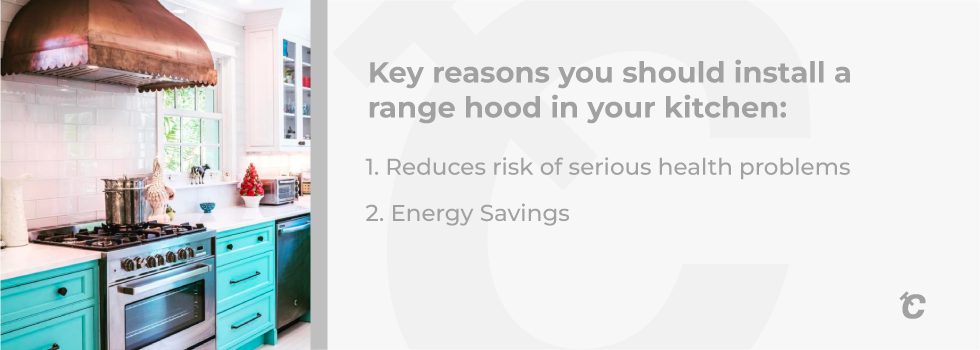
Air quality is vital in any home, especially in your kitchen.
We think a ductless hood helps you save money in the long term while keeping your house smelling fresh and clean.
You don't have to worry about leaks, dust buildup, or clogged air vents anymore.
An outside vent is essential and makes a difference to your air quality, especially if you're regularly cooking in the kitchen.
Plus, it's easier to install and maintain than traditional ventilation systems.
If you want to know more about the various materials, colors, designs, and sizes of range hoods, check out our entire selection here.
Safety Issues
Installing an outside ducted range hood yourself can be a safety issue if it is not done correctly. If the range hood or the ducts are not fitted the right way, then it can create a fire hazard in your home. At best, it will probably mean that your kitchen is constantly filled with smoke that isn’t removed from the room the way it should be.
This is one of the main reasons why it’s always best to arrange for a professional contractor to complete the installation of your ducted range hood, even if you do have some DIY experience.
While there are videos online that can guide you through this process every home is different and an installation could be trickier in your property.
Increased Costs
If there is no duct system in place in your property, then adding it is always going to be a difficult project. There’s lots of room for mistakes here. If you don’t get it right the first time, then you can quickly find that the costs start to build. It can also mean that your kitchen renovation is going to take a lot more time than originally anticipated.
Is A Ductless Range Hood Easier To Install?
A ductless range hood is easier to install compared to a ducted range hood that carries air to the outside of your home. The only step required with a ductless range hood is checking the device is working correctly and fitting it under the countertop or perhaps on the wall. If you are not sure where you should fit your ductless range hood, you can use our 3-D configurator to ensure that you find the ideal placement in your kitchen before committing to a purchase.
Although ductless range hoods certainly have an easier installation, you could also still leave it in the hands of the experts. The benefit of this is that you can ensure that the device functions correctly and looks perfect as part of your new kitchen design.
When Should You Choose A Range Hood That Is Vented Outside?
There are a few reasons why you may want to choose a range hood that is vented to the outside of your home.
You Have A Gas Oven
If you have an old-fashioned gas oven, then it’s important to realize that these products create a lot of heat and of course, leave gasses lingering in the air around your kitchen. A ductless range hood may not be powerful enough to keep your kitchen space comfortable and safe if you have this type of appliance in the room. Instead, it might be best to use a full ducted system that pushes air to the outside of your home.
Your Ductless System Isn’t Providing The Right Benefits
It’s possible that your current ductless system isn’t providing the right benefits that you want. You may have noticed that smells do linger around your home. If that’s the case, then you might need a more powerful system. However, it could also be an issue with maintenance. Regardless of the range hood you use, they do need to be maintained regularly. You should aim to inspect and clean your range hood every couple of months to provide the right benefits.
You Already Have Ducts Installed
If you already have ducts installed in your home, then it may seem foolish not to use them to pump air out of your home. However, this is always going to be a personal choice. Particularly, if the current noise of your ducted system is disrupting your home. If you are interested in switching to a brand new ductless system, then you can get a custom quote from our company today.
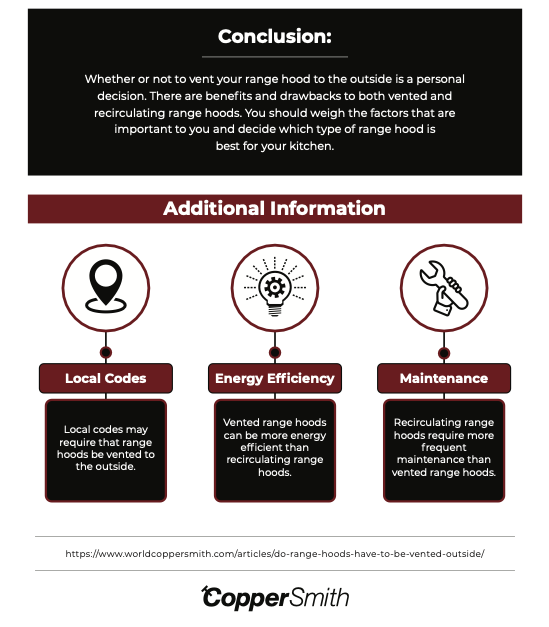
Sources:
- "Range Hoods 101", This Old House, https://www.thisoldhouse.com/kitchens/21016229/range-hoods-101
- "Do I Need a Range Hood Vent Outside? Here's What You Need to Know", Bob Vila, https://www.bobvila.com/articles/do-i-need-a-range-hood-vent-outside/
- "The Benefits of Venting a Range Hood Outside,” Ventwerx HVAC, https://www.ventwerx.com/blog/the-benefits-of-venting-a-range-hood-outside/
- "How to Choose the Right Range Hood Size, ”HGTV, https://www.hgtv.com/design/remodel/kitchen-remodel/how-to-choose-the-right-range-hood-size
- "Range Hood Maintenance,” Broan-NuTone LLC, https://www.broan-nutone.com/support/maintenance-tips/range-hood-maintenance
“How Many Sones Is A Quiet Range Hood?, “ Kitchen Ambition, https://kitchenambition.com/how-many-sones-is-a-quiet-range-hood




